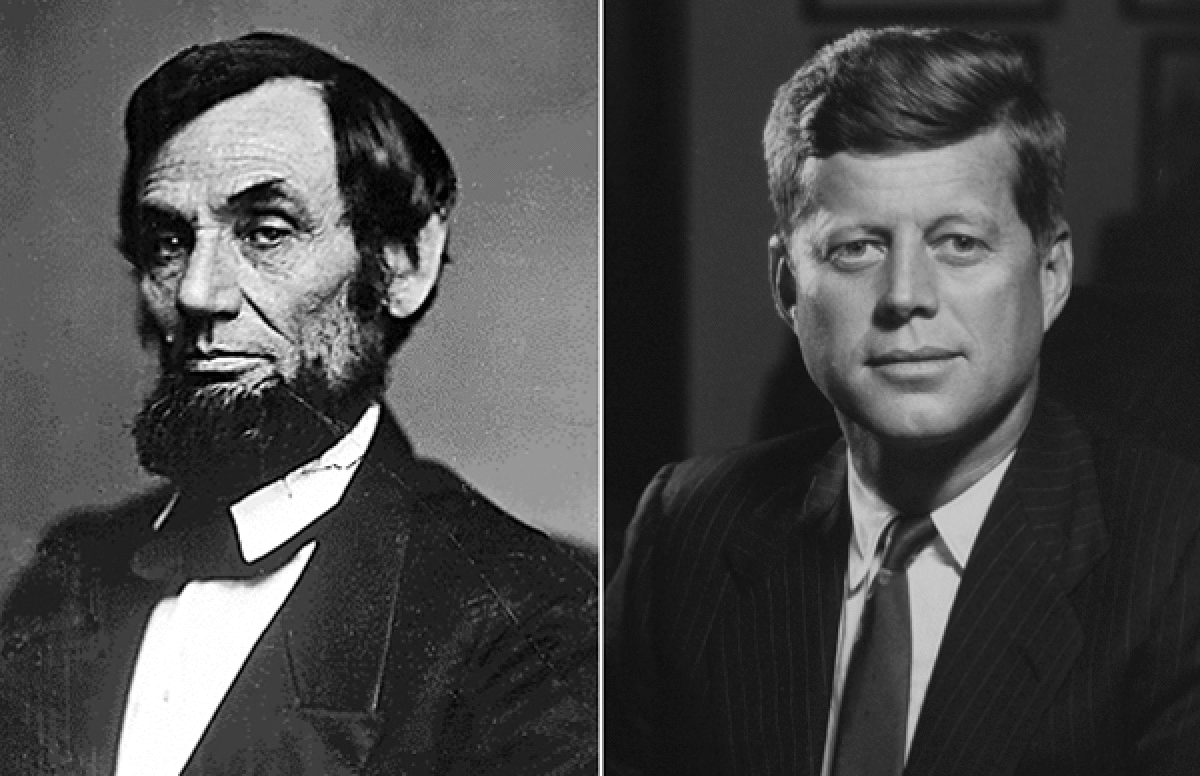Lincoln, JFK: Leaders now loved for the same reasons they were once hated

- Share via
This week, Americans from across the political and cultural spectrum have paid tribute to Presidents Lincoln and Kennedy with nostalgia-tinged reverence, a longing for a time when strong, inspiring leaders could bring us together in unity and move our country forward. The irony is that while the memories of Kennedy and Lincoln now serve mostly to unify Americans, both men were exceptionally divisive in their own times -- and the reasons they were loathed by so many back then are by and large the same reasons why they are beloved today.
Of course, when it comes to polarizing presidents, it isn’t quite fair to put Kennedy and Lincoln in the same category because no other president even comes close to being as divisive as Lincoln was. Though 91% of Americans now view Lincoln favorably (one percentage point above Jesus Christ), he won the presidency in 1860 with just 39.8% of the vote and was considered so offensive by half of the polity that the country split in two because of him.
Relative to a bloody civil war, Kennedy’s 0.17% margin of victory, the narrowest of the 20th century, and consistently diminishing approval rating over the course of his term look like downright unanimity. Today, Kennedy is viewed favorably by 74% of the country, the highest of any president of the last 50 years but still not approaching Lincoln, and so the degree to which the two presidents are now associated with unity is actually in inverse proportion to the level of controversy each man inspired among his contemporaries.
Kennedy and Lincoln both faced furious resistance to their proposed changes to the role of the federal government. Kennedy advocated a controversial national health program for the elderly called “Medicare” that future-President Reagan famously warned would end freedom in America, and by the time of Kennedy’s assassination in Dallas, it was not even considered surprising that the city would be covered in posters and fliers alleging the president’s “treason.”
A century earlier, Lincoln expanded the federal government dramatically to support the war effort, but his more contentious proposition was a fundamental shift in the definition of the relationship between the federal government and the states, and the relationship of the states to each other: As historian Gary Wills famously explained in his Pulitzer Prize-winning “Lincoln at Gettysburg,” “Up to the Civil War ‘the United States’ was invariably a plural noun: ‘The United States are a free country.’ After Gettysburg it became a singular: ‘The United States is a free country.’”
Lincoln and Kennedy each took decisive, intensely divisive action on the civil rights issues of their day. Lincoln issued the then-controversial Emancipation Proclamation and ultimately pushed through the 14th Amendment, which in concert with the 13th Amendment outlawed slavery in the United States. Kennedy’s address to the nation on civil rights was a watershed that reframed the “negro question” as a matter of morality, an oration so powerful that civil rights hero Medgar Evers was assassinated as blowback the night it was delivered.
Sadly, Kennedy’s legacy on civil rights, as with healthcare, would have to be completed by his successor, Lyndon Johnson, but Johnson himself said in his first presidential speech that his decision to prioritize civil rights legislation was in part out of deference to his fallen predecessor. That legislation was the right thing to do, but it was also so polarizing that it reshaped American politics from the 1960s onward.
Today, the positions and actions that made Kennedy and Lincoln controversial in their own times are chief among the reasons why they are so beloved. Lincoln’s vision of a singular United States is a cornerstone of modern patriotism. Slavery is universally reviled and “Honest Abe” is revered for ending it.
Kennedy’s Medicare prescription, so contentious in the 1960s, is one of the most popular programs in America and didn’t even eviscerate freedom. Indeed, more men and women are more free today because of Kennedy’s civil rights legacy, and he is widely admired for it. Meanwhile, some of the descendants of Lincoln’s and Kennedy’s opponents have been reduced to arguing that their forbears weren’t fighting to preserve slavery, that they are not opposed to Medicare or trying to end it, and that they did not capitalize politically on the backlash against desegregation -- all despite irrefutable evidence to the contrary.
If there is a lesson, then, to be learned from Lincoln and Kennedy, it is that real change is rarely unifying. Real change is disruptive and disruption is divisive. Real change moves us into an unknown that will always be frightening for some, and there will inevitably be demoralizing bumps along the way. That’s why it’s always harder to move forward than to stand still. But when the status quo is unacceptable, when men and women are enslaved or denied civil rights or left to wither in ill health, real leaders ride out the turbulence of unmoored opposition until injustice is undone. They do not give up. And though success is never certain when real change is at stake, if they do succeed, their opponents and their opponents’ successors will have little option but to distance themselves from that which they once so virulently resisted. Then, in the absence of that opposition, we can all nostalgically come together around the once-controversial leader’s unifying legacy -- as we do this week for Kennedy and Lincoln.
ALSO:
Democrats bust the filibuster, and good for them
Covered California to President Obama: Sorry, no
50 years later, JFK girlfriend Judith Campbell Exner deserves an image makeover
Joel Silberman is a Los Angeles-based writer and the producer of such viral web videos as “Legitimate Rape” Pharmaceutical Ad (TW) and Kids Do The News. Follow him on Twitter @Wordpeggio.
More to Read
A cure for the common opinion
Get thought-provoking perspectives with our weekly newsletter.
You may occasionally receive promotional content from the Los Angeles Times.






